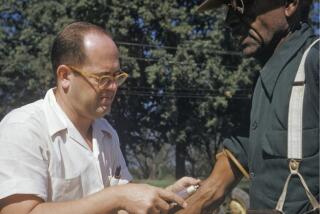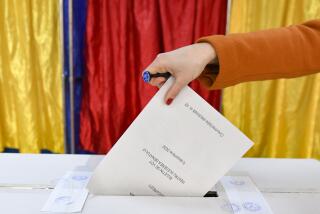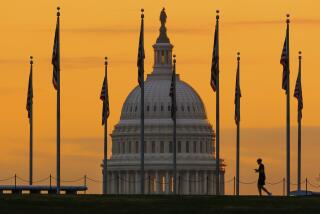Poll in Bosnia Points Up Difficulty of Unification
- Share via
WASHINGTON — A U.S. government poll of public opinion in Bosnia-Herzegovina underscores the enormous difficulties that the Bosnian Serbs, Muslims and Croats face in creating a unified, democratic country out of that war-ravaged land.
Not only are the parties to the civil war divided along stark lines on ethnic issues, according to the poll, but they also differ greatly on their view of what a democracy ought to be.
While Muslims and Croats, for example, envision a society of justice that treats everyone equally, the Serbs care far more for a society that meets their economic needs.
The poll was conceived and commissioned by the U.S. Information Agency and conducted in December by local poll-takers. A copy of the report was obtained by The Times.
The results reflect a strong desire for peace in Bosnia--a mood that augurs well for implementation of cease-fire lines, the military side of the peace agreement reached by the warring parties in Dayton, Ohio, last fall.
But the results also demonstrate the fragility of the underpinning for the civilian institutions that are supposed to develop, particularly the electoral process and the interaction between peoples that are necessary for a democratic and united state. In fact, a majority of Muslims, Croats and Serbs told the poll-takers that they had little or no interest in politics.
The pollsters interviewed 1,408 Bosnians, face to face.
In a related development, Richard Holbrooke, the architect of the peace accord, said Wednesday that the biggest challenge of the peace process is to “resolve the crunch on the civilian side.” The parties must establish an effective police force, arrange for free elections and start rebuilding the country, he said.
Speaking at a news conference on his final day as assistant secretary of state for Europe, Holbrooke denounced Congress for balking at providing funds for civilian activities that, he said, cost less than 10% of what deploying U.S. peacekeeping troops does.
“For this administration, Bosnia is the ballgame,” said Holbrooke, who plans to join an investment firm in New York. “We have staked a great deal in Bosnia. Failure is unthinkable.”
In the poll, the Bosnian public was asked to name the most important elements in a democracy. A substantial plurality of Croats and Muslims cited “a system of justice that treats everyone equally.”
On the other hand, a substantial majority of Serbs said economic issues--guarantees of economic equality and of economic prosperity--should be the top priority.
Only the Muslims showed some tendency to reach out to other people, with more than a third responding that “people can be trusted.” More than 80% of the Croats and Serbs, however, said that “you cannot be too careful in dealing with them [people].”
In this vein, a substantial majority of Muslims said they believe that the three ethnic groups could live together peacefully. But just as many Serbs and Croats said they believe that “the war has done too much damage for them to live together peacefully anymore.”
The poll showed that Serbs and Croats tend to look down on the Muslims as dishonest, inferior, uneducated and violent. Most Muslims said they do not like the Serbs but have a favorable opinion of the Croats as hard-working, superior, educated and progressive.
All sides agreed overwhelmingly that the accord is better than war, the poll found.
But the Serbs have a far different view of the war than the others. The Croats and Muslims agreed with much of the world that Serbs have been the aggressors and Muslims the main victims. But the Serbs insisted that Muslims started the fighting and Serbs were the greatest victims.
The Serbs also tended to look on those implementing the Dayton accord as anti-Serb. While more than 90% of the Muslims and Croats said they had a favorable opinion of the United States, 86% of the Serbs said their opinion was unfavorable. A substantial majority of the Serbs also had little or no confidence in the North Atlantic Treaty Organization.
Times staff writer Norman Kempster contributed to this story.
More to Read
Sign up for Essential California
The most important California stories and recommendations in your inbox every morning.
You may occasionally receive promotional content from the Los Angeles Times.













